
The Complete Guide to Human Composting Services in Los Angeles
Why Human Composting is Changing Los Angeles Death Care
Human composting Los Angeles services are revolutionizing how families approach end-of-life care in Southern California. While the practice won't be legally available within California until 2027, Los Angeles residents can currently access these eco-friendly services through transport to facilities in Washington state.
Quick Facts for Los Angeles Families:
- Legal Status: Not yet legal in CA (effective 2027), but transport services available now
- Current Cost: $5,000-$7,000 for composting + $3,500-$5,000 for transport
- Timeline: 60-90 days to transform body into nutrient-rich soil
- Providers: Recompose, Return Home, Earth Funeral serve LA residents
- Output: ~1 cubic yard of soil per person for memorial use
This sustainable alternative to burial and cremation transforms human remains into fertile soil through natural decomposition. The process uses wood chips, alfalfa, and straw in controlled vessels to create conditions similar to a forest floor.
Environmental Impact:
- Saves over 1 metric ton of CO₂ compared to cremation
- Uses 87% less energy than conventional burial
- Creates soil for conservation projects and memorial gardens
I'm Mortuary Cooler, a national-level mortuary equipment supplier who has worked extensively with funeral homes adapting to emerging practices like human composting Los Angeles services.
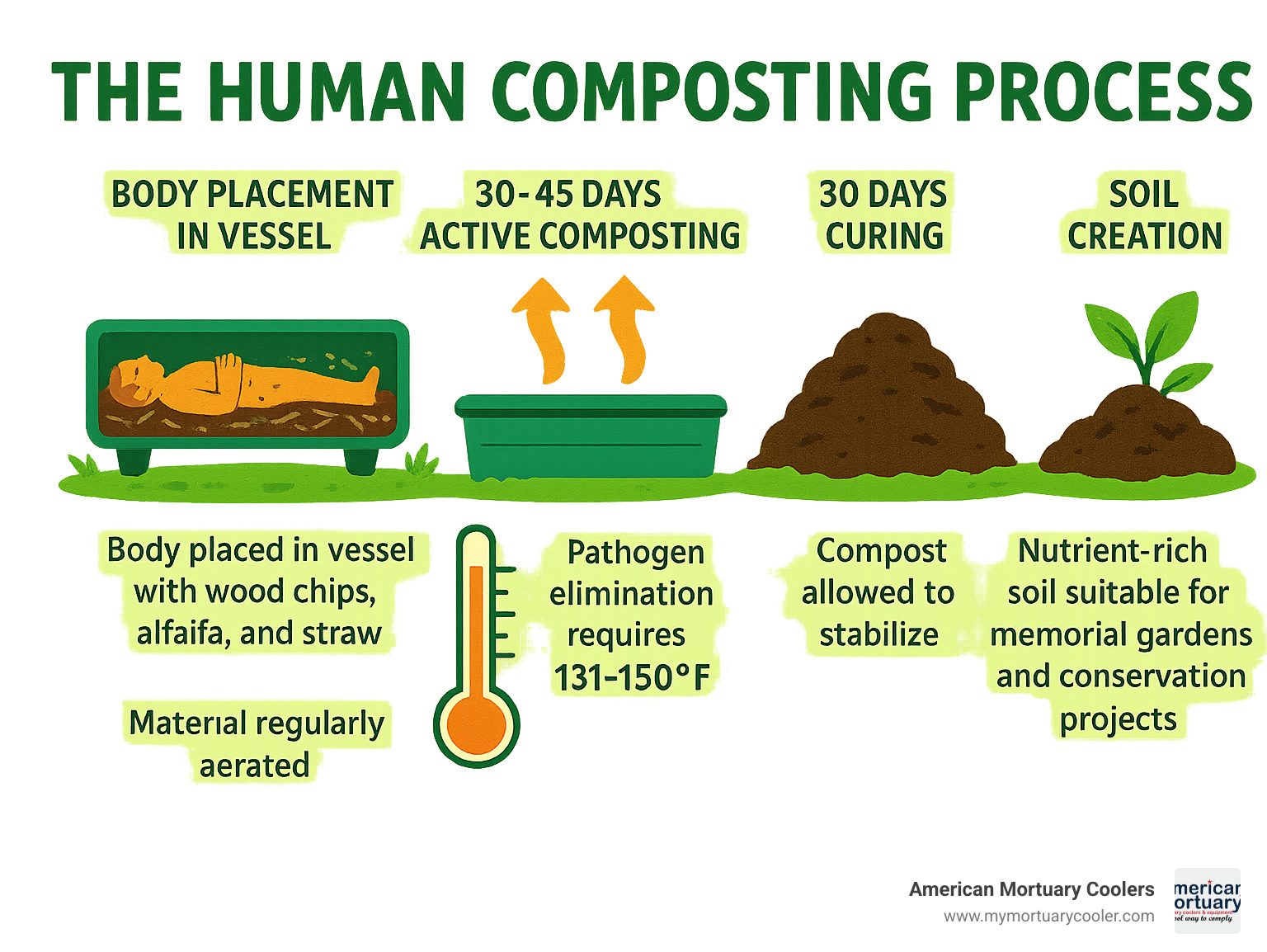
Human composting Los Angeles terms explained:
What Is Human Composting & How It Works
Human composting Los Angeles families are choosing represents one of nature's most neat processes - turning what was once living back into life-giving soil. Also called natural organic reduction or terramation, this gentle method mirrors what happens on forest floors worldwide.
The process happens inside specially designed stainless steel vessels filled with organic materials like wood chips, alfalfa, and straw. These create the perfect environment for naturally occurring microbes to transform organic matter into fertile soil.
During the active phase, temperatures naturally climb to 131-150°F for at least three consecutive days. This heat eliminates harmful pathogens while allowing beneficial microbes to flourish. After 30-60 days of active composting, any remaining bone fragments get pulverized and mixed back into the developing soil.
The material then undergoes a curing period of 3-5 weeks. The final result? Approximately one cubic yard of nutrient-rich soil - roughly 500-1,000 pounds of earth perfect for supporting new plant growth.
Unlike cremation, which produces about 535 pounds of CO₂ per body, human composting is completely carbon neutral. For families interested in learning more technical details, our in-depth guide to human body composting covers the process extensively.
Step-by-Step Timeline
Laying-In (Day 1) begins with a ceremony where bodies are gently placed in the composting vessel, often accompanied by flowers, letters, or other biodegradable mementos.
Active Composting Phase (Days 1-45) is when natural microbes start breaking down tissues while the vessel maintains optimal conditions. The compost gets periodically rotated to ensure even decomposition.
Curing Phase (Days 46-75) allows the composted material to rest and stabilize. Any remaining bone fragments are carefully processed and reincorporated during this phase.
Soil Return (Day 75-90) brings the journey full circle. The finished soil undergoes safety testing before being packaged for families.
Scientific Research Behind Terramation
The process relies on thermophilic composting, where heat-loving microbes create sustained high temperatures needed to eliminate pathogens. Research shows that maintaining temperatures above 131°F for 72+ hours effectively eliminates viruses, bacteria, and parasites.
Each human composting cycle saves 0.84-1.4 metric tons of CO₂ compared to conventional burial or cremation. The scientific research on composting process provides excellent background on the broader composting science.
Legal Status, Permits & Future Facilities in California
California passed Assembly Bill 351 (AB 351) in September 2022, but families must wait until January 2027 for the law to take effect. This delay gives state agencies time to develop proper regulations and oversight procedures.
Right now, Los Angeles families who want human composting must work with funeral homes to transport their loved ones to Washington state, where the process has been legal since 2019. This requires navigating interstate transport regulations but is completely legal and increasingly common.
Several companies are already planning facilities in Southern California for the 2027 launch date. For detailed information about the evolving legal landscape, check out our comprehensive guide to body composting laws in California.
Is Human Composting Legal in Los Angeles?
Human composting Los Angeles residents can access these services legally, but the actual composting must happen outside California until 2027. About 15% of Recompose's clients are shipped from California, showing strong market demand.
This current arrangement means Los Angeles families work with local funeral homes to coordinate transport to facilities like Recompose in Seattle or Return Home in Auburn, Washington. The process is well-established and regulated.
The 2027 timeline gives families an advantage for pre-planning. Many providers offer pre-need contracts that lock in current pricing and guarantee service when California facilities become available.
Paperwork & Permitting Checklist
Arranging human composting from Los Angeles involves more paperwork than local services, but most human composting providers work directly with Los Angeles funeral homes to streamline this process.
Essential documents include a death certificate from Los Angeles County, disposition permit from local authorities, and interstate transport permit for moving the body to Washington state.
The process typically starts with contacting a participating funeral home experienced with human composting transport. They handle most bureaucratic details and arrange actual transport to the out-of-state facility.
Timing is important - interstate transport requires additional processing time. Most providers recommend starting arrangements as soon as possible after death occurs.
Environmental & Community Benefits of Becoming Soil
When you choose human composting Los Angeles services, each person saves more than one metric ton of carbon. That's like taking a car off the road for an entire year.
Cremation releases about 535 pounds of CO₂ into the atmosphere for every body processed. Traditional burial isn't much better when you factor in resources needed for casket manufacturing, concrete vaults, and ongoing cemetery maintenance.
Human composting flips this equation entirely. Instead of releasing carbon, the process actually locks carbon into the soil where it belongs. The resulting earth actively helps plants grow stronger and healthier.
Water conservation is another huge win, especially in drought-conscious California. Traditional cemeteries require constant irrigation. Human composting eliminates this ongoing water demand while creating soil that helps other landscapes retain moisture naturally.
The process also keeps harmful chemicals out of groundwater. Traditional embalming relies on formaldehyde and other preservatives that can leach into soil and water systems. Human composting uses only organic materials with zero chemical additives.
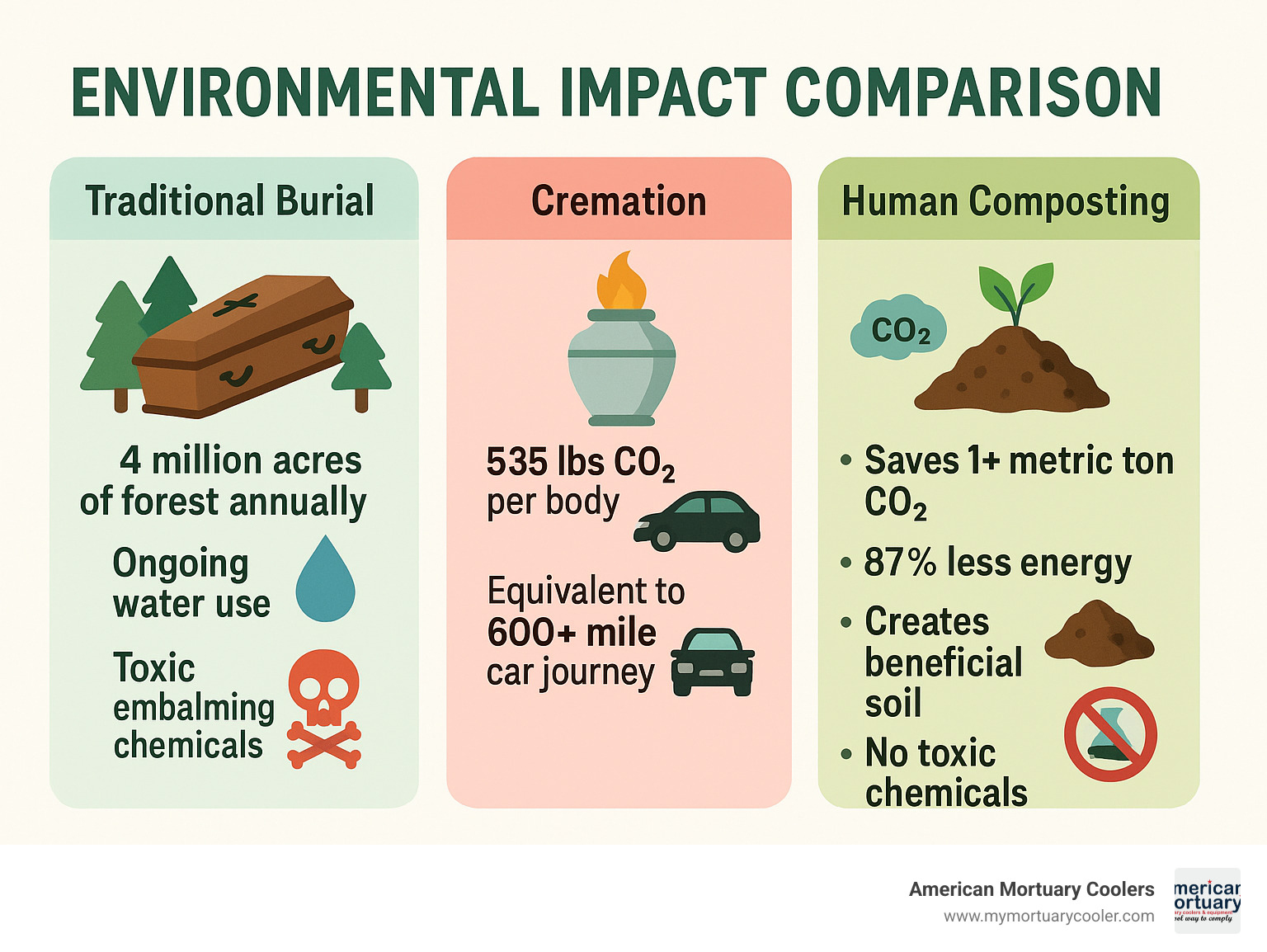
Many families find comfort knowing their choice supports broader conservation efforts. Some providers partner with organizations like One Tree Planted to use donated soil for forest restoration projects.
For current research on climate impact, this analysis of California's human composting law provides excellent context on environmental benefits.
Using or Donating the Soil
Families receive approximately one cubic yard of nutrient-rich soil from each human composting process - far more than most can use personally. This creates meaningful opportunities for both personal memorialization and community benefit.
Personal Memorial Uses:
- Planting memorial trees or gardens
- Nourishing houseplants and flower beds
- Creating small keepsake containers for family members
- Scattering in meaningful natural locations (with landowner permission)
Conservation Donations: Most families choose to keep a small portion of soil for personal use while donating the remainder to conservation projects. Partner organizations use donated soil for:
- Ecosystem restoration on protected lands
- Rewilding projects supporting wildlife habitat
- Forest regeneration after fires or logging
- Supporting species like elk, beaver, and juvenile salmon
The soil has a pH of 6.5-7 with balanced macronutrients, making it excellent for most plants. Unlike cremated ashes, which can be harmful to plants due to high salt content, composted soil actively nourishes plant growth.
Human Composting Los Angeles: Costs, Providers & Pre-Planning Options
Planning for human composting Los Angeles services means understanding both current costs and your options. The total investment typically ranges from $8,500 to $12,000, which includes both the composting process ($5,000-$7,000) and transport to out-of-state facilities ($3,500-$5,000).
While this might seem significant, it's actually comparable to traditional burial costs in Los Angeles. Cemetery plots alone can run $3,000 to $15,000, before adding caskets, headstones, and ongoing maintenance fees.
Most providers offer prepaid plans starting around $100 per month, which lets you lock in today's pricing while spreading costs over time. This is especially smart given California's 2027 timeline.
For families just starting to explore this option, our beginner's guide to terramation covers the essential basics.
How Much Does Human Composting Los Angeles Service Cost?
Breaking down human composting Los Angeles pricing helps families budget realistically. The base composting service ranges from $5,000 at Earth Funeral up to $7,000 at Recompose.
Transport costs add another $3,500 to $5,000 on average. You'll also need to budget for death certificates ($25-$50 each), and if you work with a local funeral home for coordination, expect another $500 to $1,500.
When compared to other options, traditional burial in Los Angeles typically runs $7,000 to $15,000 or more, while cremation costs between $3,000 and $6,000. Human composting falls in the middle at $8,500 to $12,000 total.
Current & Upcoming Providers Serving LA
Recompose in Seattle pioneered commercial human composting with 33 composting vessels in a beautiful greenhouse setting. About 15% of their clients come from California, so they're familiar with serving Los Angeles families.
Return Home in Auburn, Washington takes a hands-on approach with 74 custom-designed composting vessels. They emphasize family involvement and maintain an 8-acre woodland where families can donate soil for conservation projects.
Earth Funeral operates from Las Vegas, making them geographically closer to Los Angeles families. Their facility runs 75 composting vessels using 100% renewable energy and includes tree planting with each service.
Clarity Funerals & Cremation represents the first Southern California funeral home to offer terramation partnerships. They work with Return Home for processing but handle all local Los Angeles logistics.
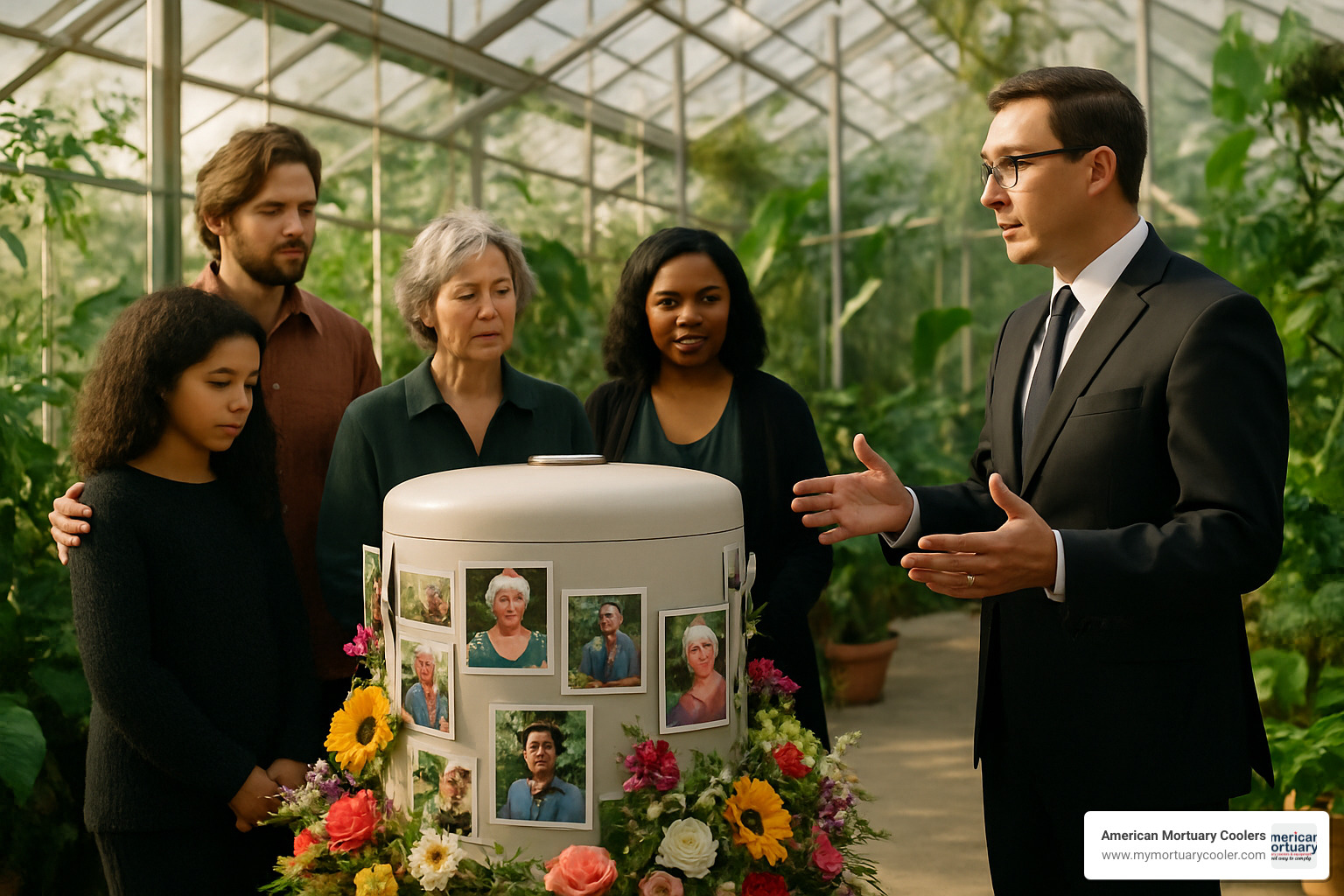
Ceremonies, Cultural & Religious Considerations
Planning meaningful ceremonies around human composting Los Angeles services allows families to honor their loved ones while celebrating their final contribution to the earth.
The journey often begins with a laying-in ceremony at the composting facility. This gentle ritual allows family members to place their loved one in the vessel surrounded by organic materials. Families can add biodegradable mementos - handwritten letters, favorite flowers, or small meaningful objects.
Many facilities welcome families to decorate the vessel exterior with photos, artwork, and personal items during the 30-60 day composting period. The dual ceremony approach works beautifully - holding a traditional memorial service shortly after death, then participating in the more intimate laying-in ceremony with close family.
Religious adaptation requires thoughtful consideration. The California Catholic Conference initially opposed human composting legislation, though many individual Catholics have acceptd the practice as environmental stewardship.
Jewish communities have shown interest in adapting traditional elements for human composting. Some rabbis appreciate how the process literally fulfills the biblical concept of "dust to dust" while creating something beneficial for future generations.
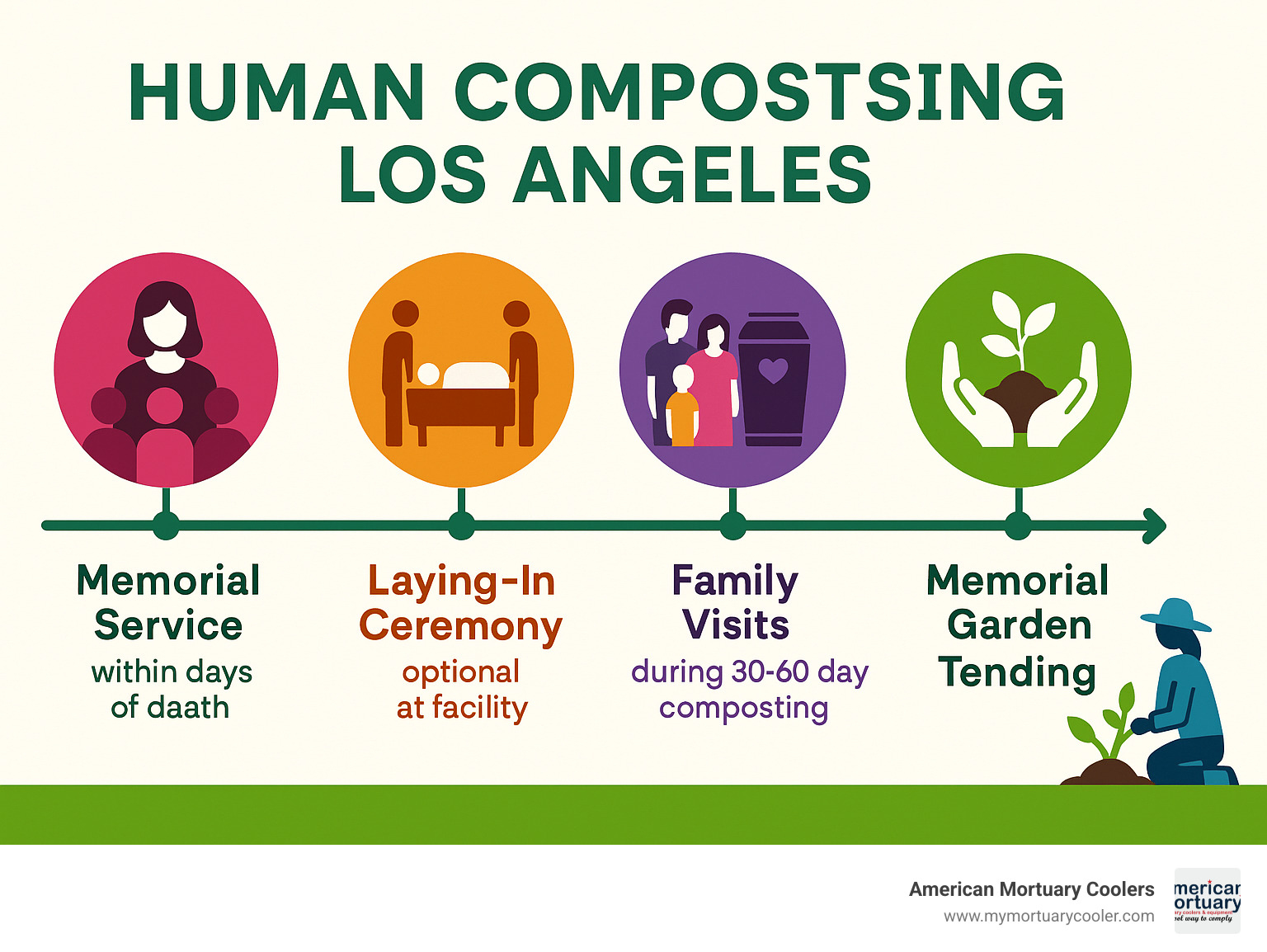
For comprehensive information about different approaches, see our guide to body composting options.
Family Participation & Memorial Ideas
The hands-on nature of human composting creates opportunities for family involvement that many find deeply healing. During the composting period, families can visit their loved one's vessel where facilities allow.
Vessel decoration becomes a collaborative art project. Memorial tree planting remains the most popular choice when soil returns. Memorial garden projects allow ongoing connection through tending and care. Hiking expeditions for soil scattering create journey-based memorials.
Addressing Faith-Based Questions
Religious considerations often center on body integrity, reverence, and resurrection beliefs. Many religious leaders point out that traditional burial also results in decomposition - human composting simply makes that natural process intentional and beneficial.
Environmental stewardship values resonate strongly with faith communities focused on creation care. The key lies in pastoral guidance custom to each family's specific beliefs and denominational teachings.
Frequently Asked Questions About Human Composting in Los Angeles
Families considering human composting Los Angeles services often have detailed questions about the practical aspects of this new option.
What happens from pickup to finished soil?
A local funeral home coordinates pickup and necessary paperwork, including death certificates and transport permits for crossing state lines.
Once your loved one arrives at the composting facility in Washington state, they're gently placed in a stainless steel vessel surrounded by wood chips, alfalfa, and straw. Over the next 30-60 days, naturally occurring microbes do their work while the facility maintains perfect conditions.
After the active phase, any remaining bone fragments are gently processed and mixed back into the rich compost. The material then rests and cures for another 3-5 weeks. The entire process typically takes 8-12 weeks from start to finish, ending with about one cubic yard of soil returned to your family.
Can families witness or personalize the process?
Absolutely. The laying-in ceremony offers your first opportunity to participate meaningfully. You can add biodegradable letters, flowers, or other meaningful items to the vessel.
Many facilities encourage families to decorate the vessel's exterior with photos, artwork, or personal mementos during the composting period. Virtual participation has become important for California families, with most providers offering video calls for laying-in ceremonies and regular photo updates.
Will new facilities open in Los Angeles before 2027?
Unfortunately, California law prevents any human composting facilities from operating before January 2027. However, demand signals are incredibly strong, with about 15% of current human composting clients transported from California.
Early planning advantages exist even with the 2027 timeline. Many providers offer pre-planning services that lock in current pricing and guarantee arrangements once California facilities open.
Conclusion
Human composting Los Angeles services offer something truly special - a way to transform our final chapter into a gift for the earth. While we'll need to wait until 2027 for California facilities, transport options available today mean Los Angeles families can already choose this meaningful path.
Instead of contributing to carbon emissions or taking up precious land, you become rich soil that helps forests grow back after fires, supports wildlife habitat, and nourishes memorial gardens where grandchildren will play.
Getting started is easier than you might think. First, research the providers - Recompose, Return Home, Earth Funeral, and local partners like Clarity Funerals each offer different approaches. Pre-planning makes financial sense, letting you lock in today's pricing while spreading costs over time. Talk with your family about this choice and consult with religious leaders if faith is important.
Planning how you'll use the soil creates something to look forward to during grief. Will you plant a memorial tree? Create a family garden? These decisions help turn loss into legacy.
The environmental impact is remarkable. Each person who chooses human composting saves over a metric ton of carbon emissions - equivalent to taking a car off the road for months.
As someone who's worked with funeral homes across the country - including here in Los Angeles - I've seen how families light up when they find human composting. There's something hopeful about it that feels different from traditional options.
The funeral industry is changing, and sustainable death care is becoming more than just a trend. At American Mortuary Coolers, we've been supporting funeral homes as they adapt to serve families who want their final choices to reflect their environmental values.
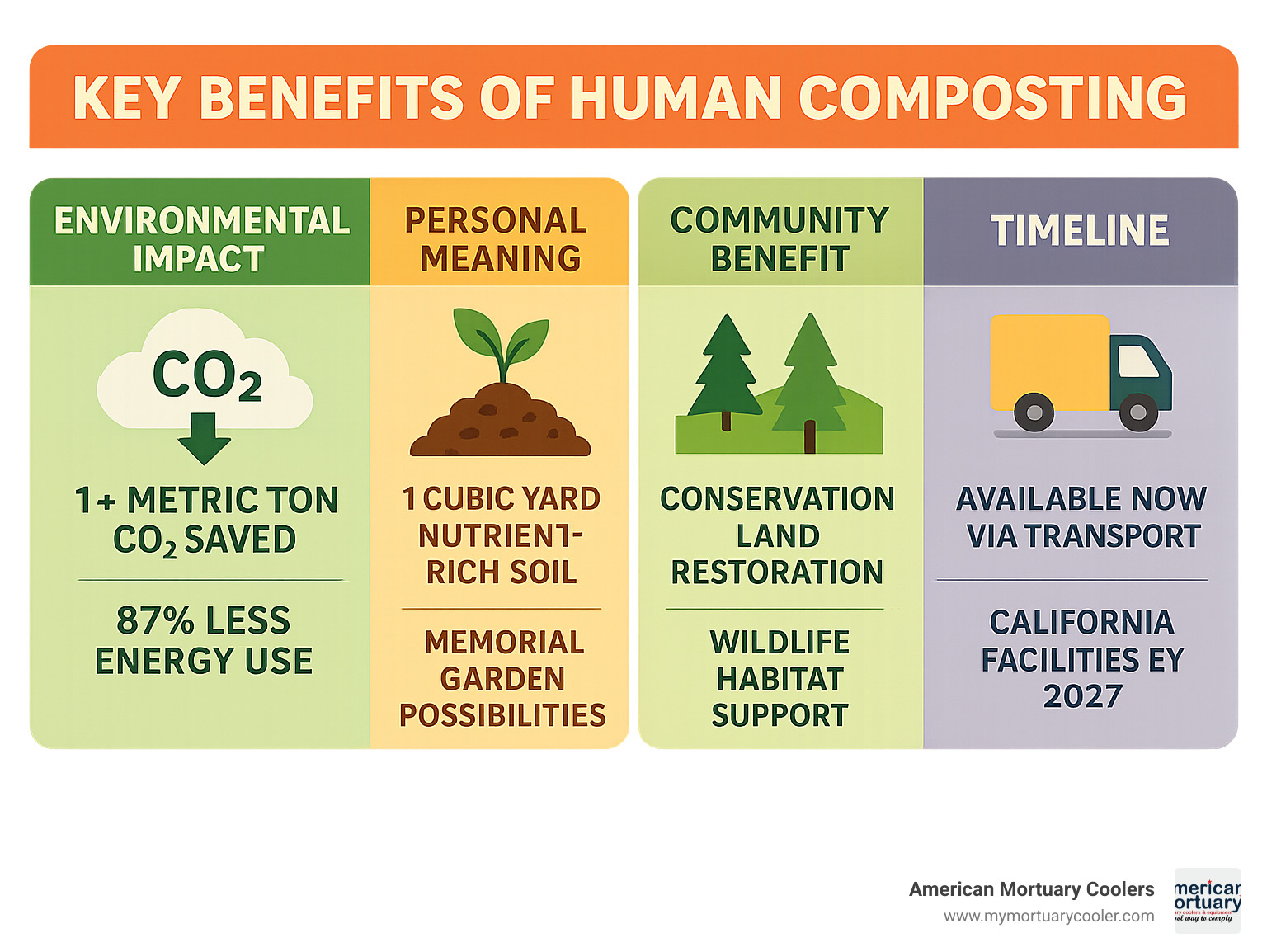
The soil created through human composting becomes a living legacy. It supports trees that will shade future generations, flowers that bring joy to strangers, and ecosystems that house countless creatures. In a world heavy with environmental challenges, choosing human composting is choosing hope.
Whether you decide on current transport services or prefer to wait for California facilities in 2027, the important thing is starting the conversation now. Human composting represents Los Angeles at its best - innovative, environmentally conscious, and deeply caring about the legacy we leave behind.
For families ready to learn more, our comprehensive guide to body composting laws in California keeps you updated on developments in this rapidly evolving field.




